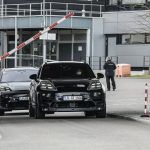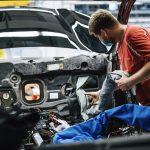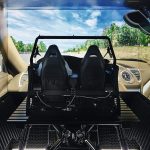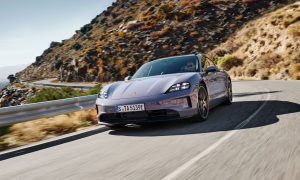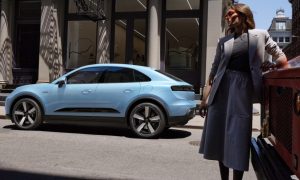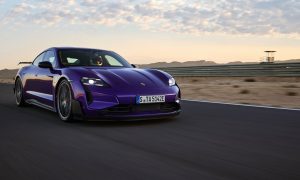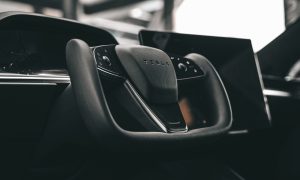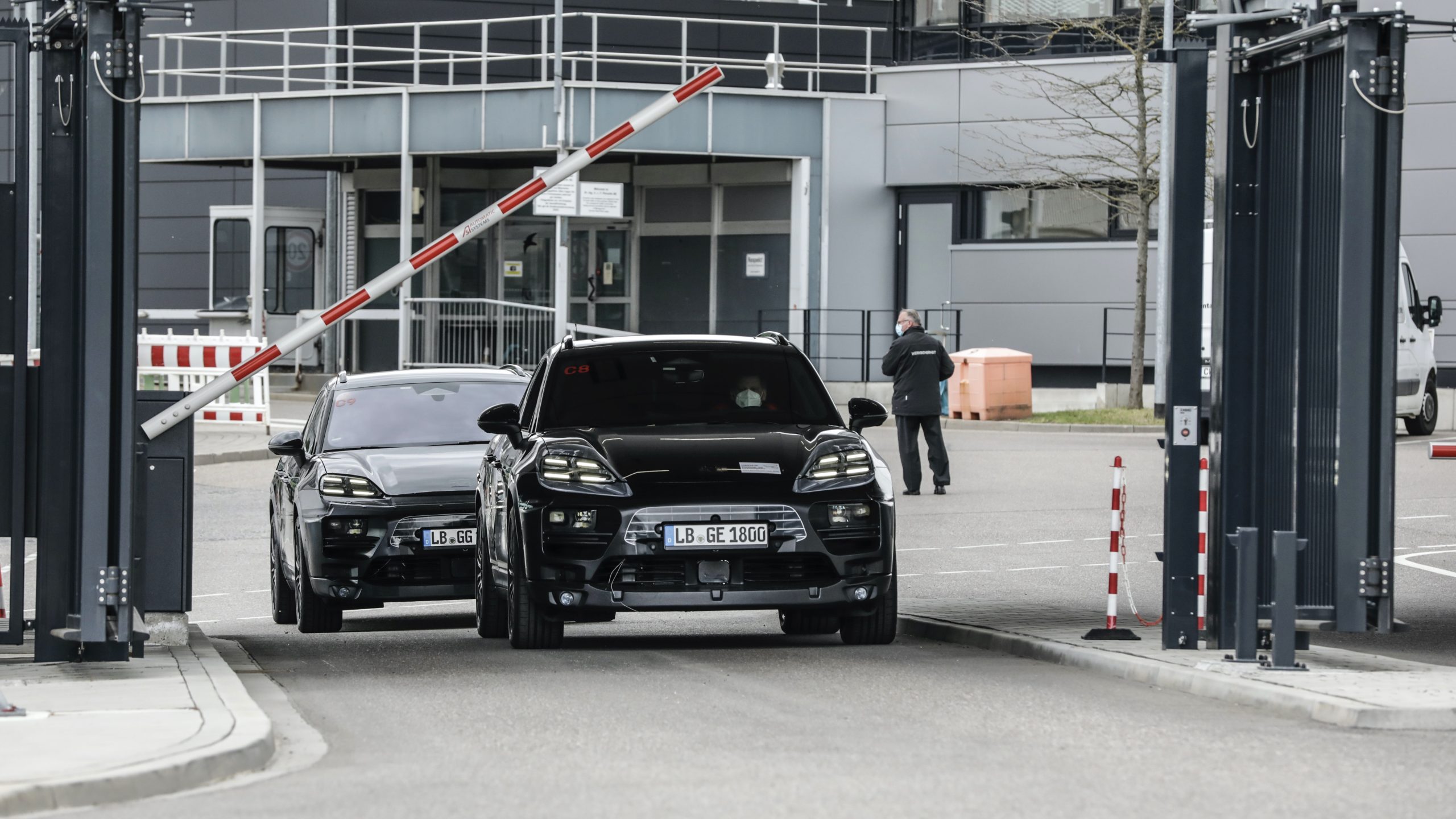

News
Porsche Macan EV begins real-world testing: Taycan-like infrastructure, release date revealed
Porsche announced earlier today in a press release that the all-electric Macan has started real-world testing, beginning one of the most important milestones in automotive development. Along with the announcement that the vehicle has left the proving grounds at the company’s Development Center in Weissach, Germany, Porsche also revealed when it plans to launch the Macan EV into the highly-competitive electric segment, along with some preliminary specs that are similar to the all-electric Taycan from the luxury German automaker.
Porsche’s press release revealed the Macan EV wouldn’t enter the market until 2023, but the automaker is doing its due diligence now to ensure that it is ready for purchase by that time. “Testing in a real-life environment is now getting underway – one of the most important milestones in the development process,” Member of the Executive Board, Research and Development Michael Steiner said. By the time it hits the market in two years, Porsche will have covered around 3 million test kilometers worldwide in a wide array of conditions to ensure its safety and performance.
Michael Steiner with the Porsche Maycan prototypes. (Credit: Porsche)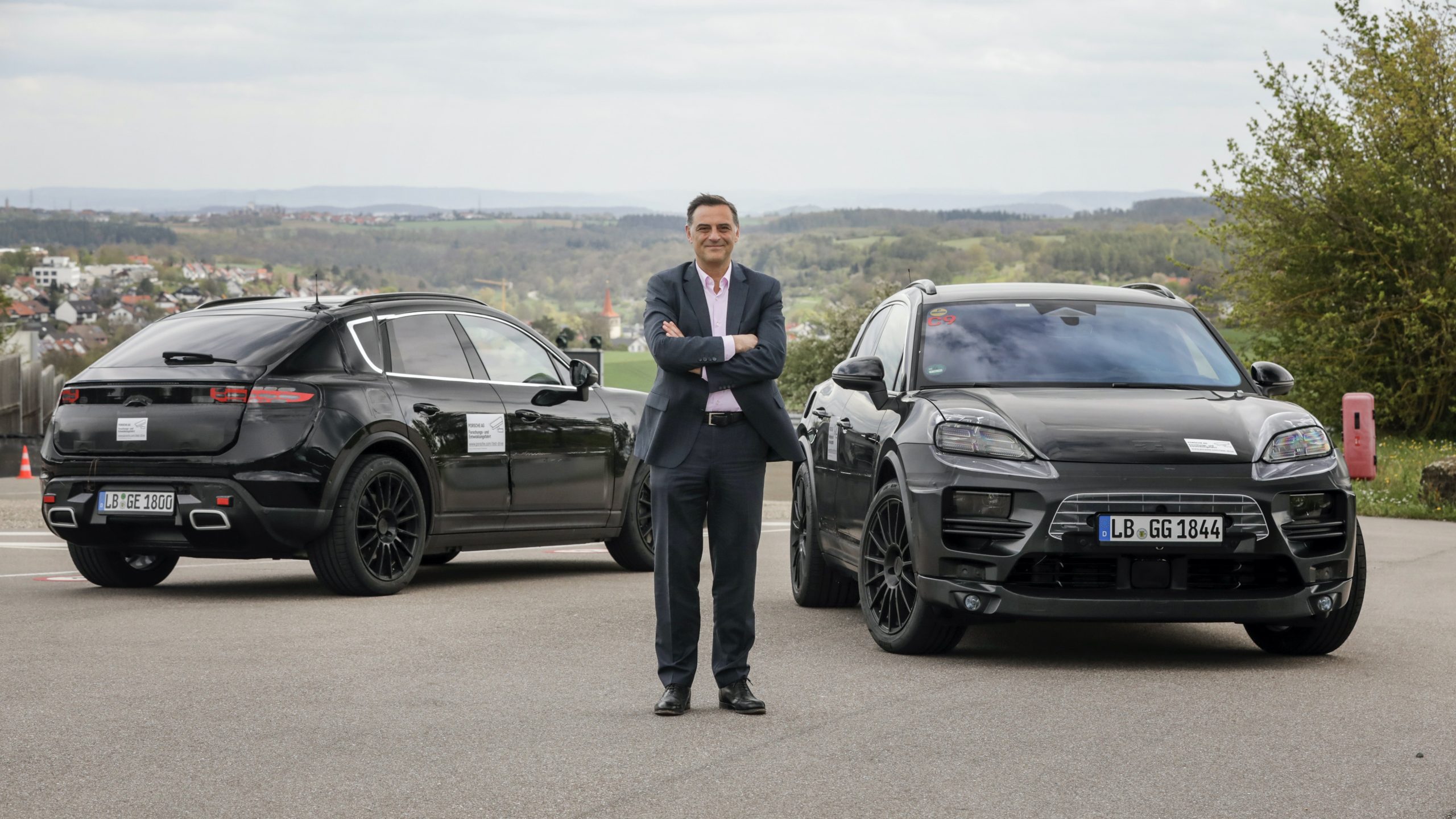
The Macan EV has been in development for about two years. Previously, Porsche was utilizing digital testing and development processes to save time and costs. It also makes the development process of a vehicle more sustainable and gives high degrees of accuracy to numerous testing processes, including aerodynamics. An example of the aerodynamic development process is pictured below.
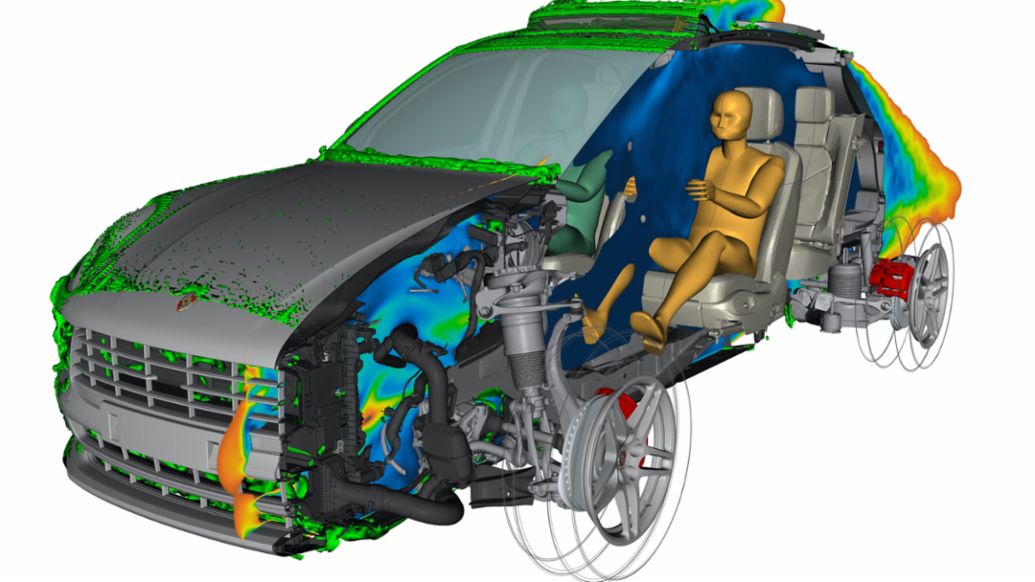
The digital testing process contributes much more than statistics and data. The first physical builds of the Macan EV were built upon the data that Porsche obtained from its simulations. The prototypes are then regularly adapted based on the virtual refinement process, Porsche said. Inversely, the findings from real-world testing scenarios are then fed back into digital development. “Endurance testing on closed-off testing facilities and public roads in real-life conditions is still indispensable to ensure that the vehicle structure, operational stability and reliability of hardware, software, and all functions meet our high-quality standards,” Steiner added.
Although the vehicle is entering some of the final and most crucial stages of development, Porsche is already releasing some information regarding the specifications and electrical architecture that it will utilize. Identical to the Taycan, the Macan EV will also use an 800-volt architecture, offering “typical Porsche E-Performance,” Steiner said. The 800-volt architecture allows for fast charging at 270 kilowatts, and Porsche plans to have two battery sizes available for the Macan. It will also reportedly have “significantly” more range than the Taycan, which the EPA tops out at 201 miles. However, some tests have shown significantly more range than that.
- Credit: Porsche
- Credit: Porsche
- Credit: Porsche
Because the Macan EV will utilize the same voltage architecture as the Taycan, the performance and range will be similar between the two models. However, Porsche plans to build the Macan on the new Premium Platform Electric (PPE) architecture that will be used on future Audi and Porsche products.
Porsche is “positioning itself flexibly for the transition to pure electromobility,” the company says. As the global automotive market becomes more inclined to purchase electric powertrains, Porsche is using its experience to strategically plan more electric models for the coming years. In Europe, demand for electric vehicles continues to rise, but the pace of change varies considerably across the world,” Steiner said.
Elon Musk
Elon Musk confirms Grok 4 launch on July 9 with livestream event
The rollout will be accompanied by a livestream at 8 p.m. Pacific Time.
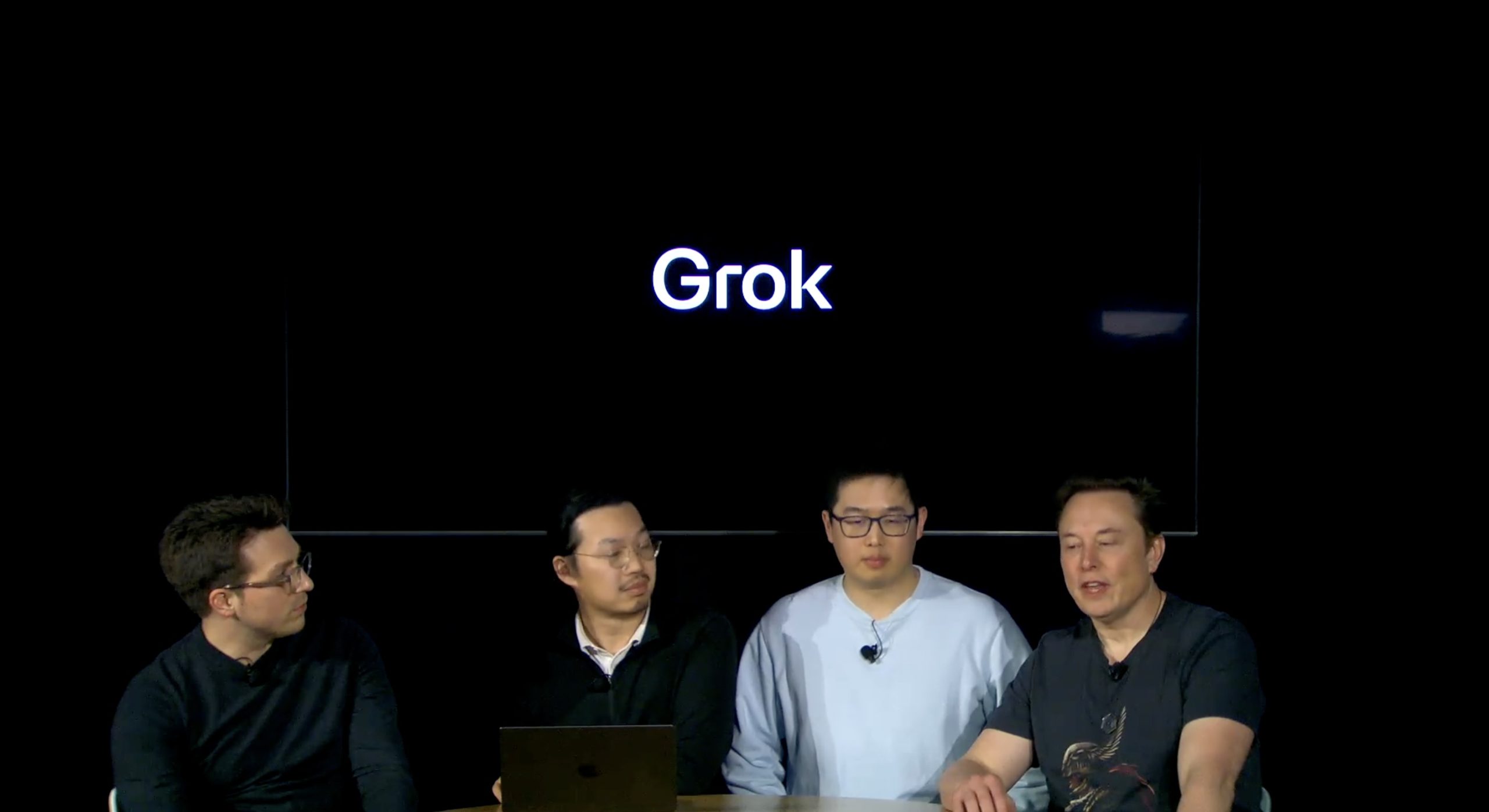
Elon Musk has officially confirmed that Grok 4, the latest version of xAI’s large language model, will launch on July 9. The rollout will be accompanied by a livestream at 8 p.m. Pacific Time, hosted on xAI’s official account on X.
xAI goes straight to Grok 4
Back in May, leaks indicated that xAI was getting ready to ship Grok 3.5. Considering Musk’s recent comments, however, it appears that the artificial intelligence startup would be focusing on the large language model’s fourth iteration instead. As noted in a Financial Express report, users on X have sighted references to Grok 4 in the lead up to the update’s launch, such as “grok-4-prod-mimic” and “Grok 4 Code.”
Musk’s Grok 4 announcement comes as AI competition intensifies between major players including OpenAI, Google, and xAI. With Musk’s Colossus supercomputer fully operational in Memphis, xAI appears to be accelerating its AI product roadmap.
Musk pushes Grok toward political neutrality
Grok 4’s launch also follows a recent controversy involving political bias, as noted in a CNN report. Last week, Grok responded to a user on X stating that political violence in the U.S. since 2016 had come more from the political right than the left. The chatbot noted in a later reply that its answer was based on information from sources like Reuters, the Journal of Democracy, and University of Maryland studies.
Musk stated that Grok’s response was a “major fail.” “Major fail, as this is objectively false. Grok is parroting legacy media. Working on it,” he wrote in a post on X. By the end of June, Musk noted that he was “grinding all night with the xAI team” and that they were making “good progress.” He also stated that the model “Will be called Grok 4. Release just after July 4th. Needs one more big run for a specialized coding model.”
News
Tesla opens massive solar Supercharger station in California
The Supercharger opened to customers ahead of Fourth of July weekend, while Tesla continues phase two of construction on the site.
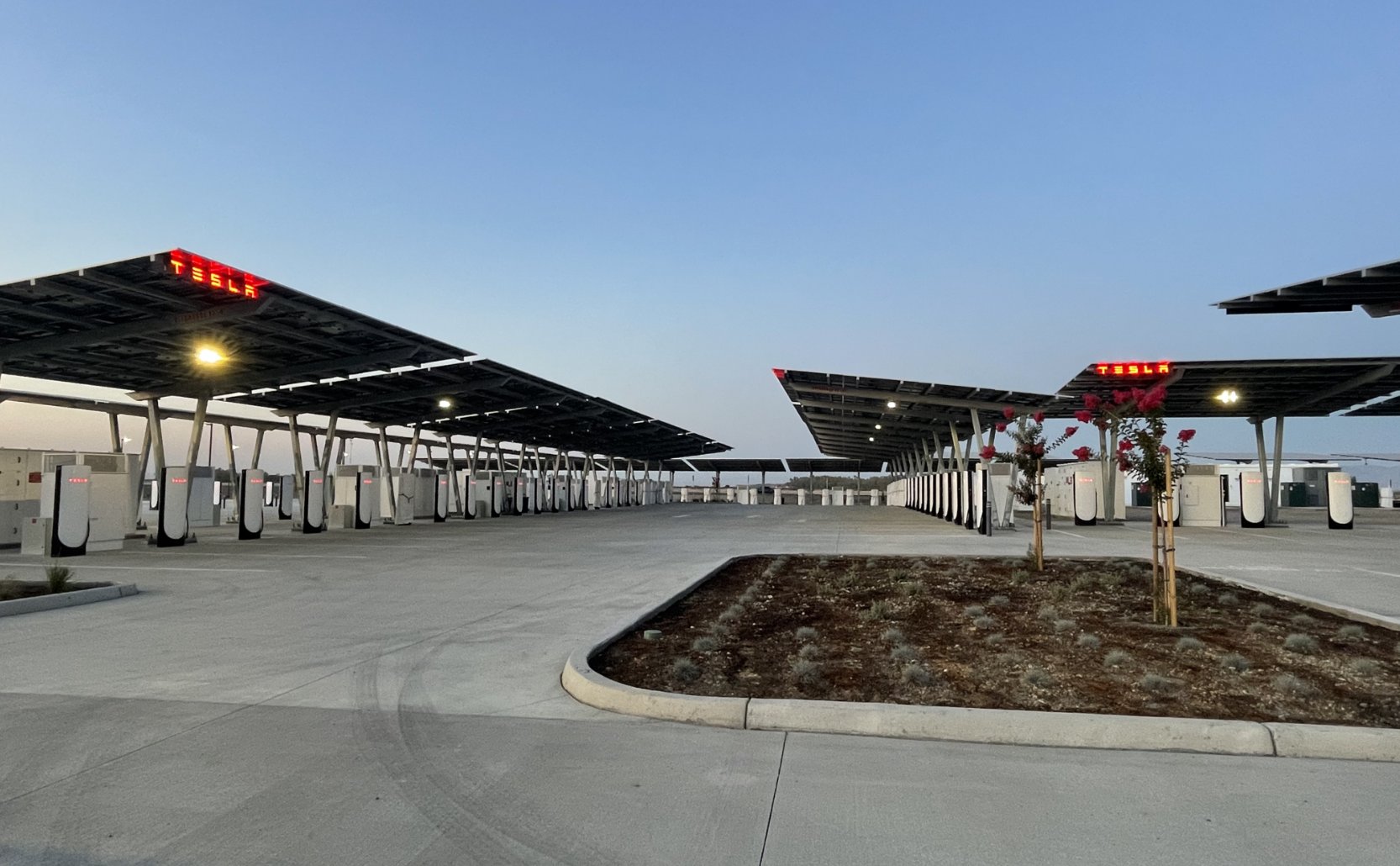
Tesla has officially launched the first several Supercharging posts at a massive station in California, notably including solar canopies and grid-scale batteries to offer completely renewable charging.
Last week, Tesla announced on X that it opened the first 84 Supercharger stalls of a planned 168-stall station in Lost Hills, California. Additionally, the massive Supercharger project features 11MW of solar canopies and 10 Megapack batteries for off-grid charging powered entirely by solar energy.
Tesla completed the first phase of the project just days ahead of the busy Fourth of July holiday weekend, adding that initial construction took just eight months. In addition to the remaining charging stalls, Tesla says it’s building a set of lounge areas, renderings of which can be seen below alongside current photos of the site.
Notably, the site also includes V4 charging posts for the company’s latest available charging speeds, and it’s located near the busy junction between I-5 and Highway 46 in Kern County.
“Thank you [Kern County] and [PG&E] for collaboration and approvals,” Tesla wrote in a follow-up post.
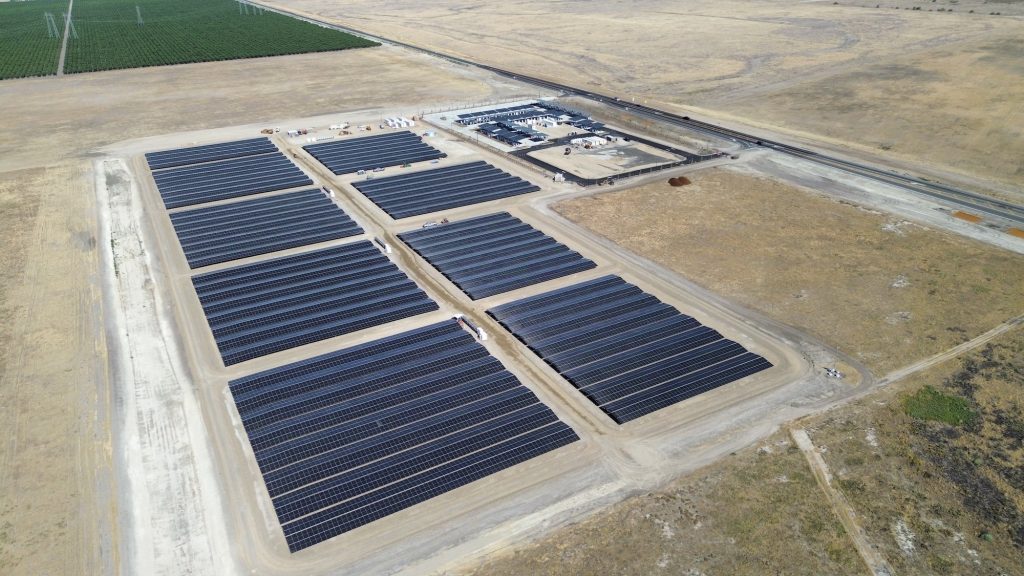
Credit: Tesla Charging | X
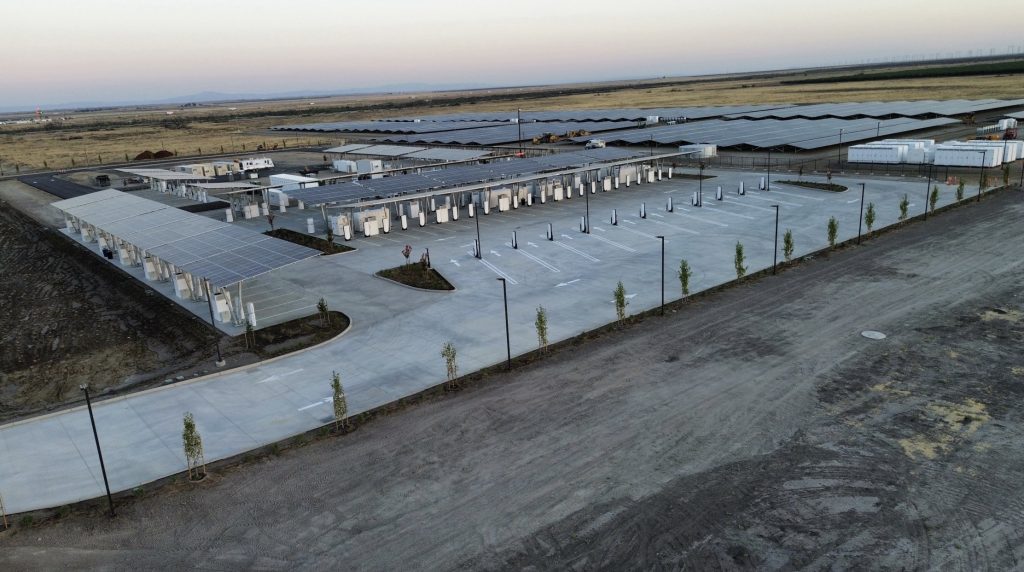
Credit: Tesla Charging | X
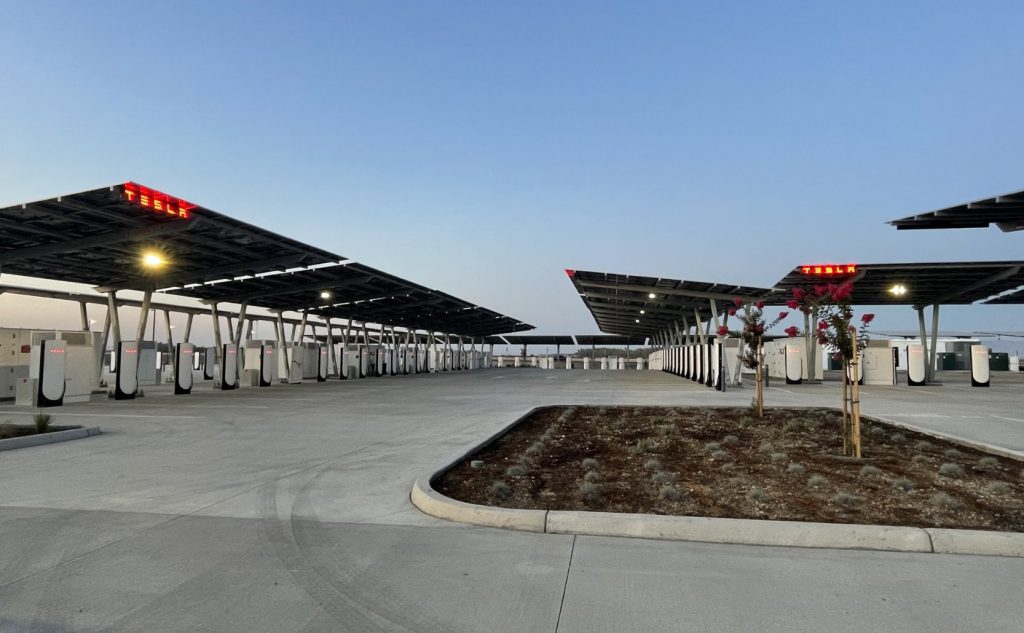
Credit: Tesla Charging | X
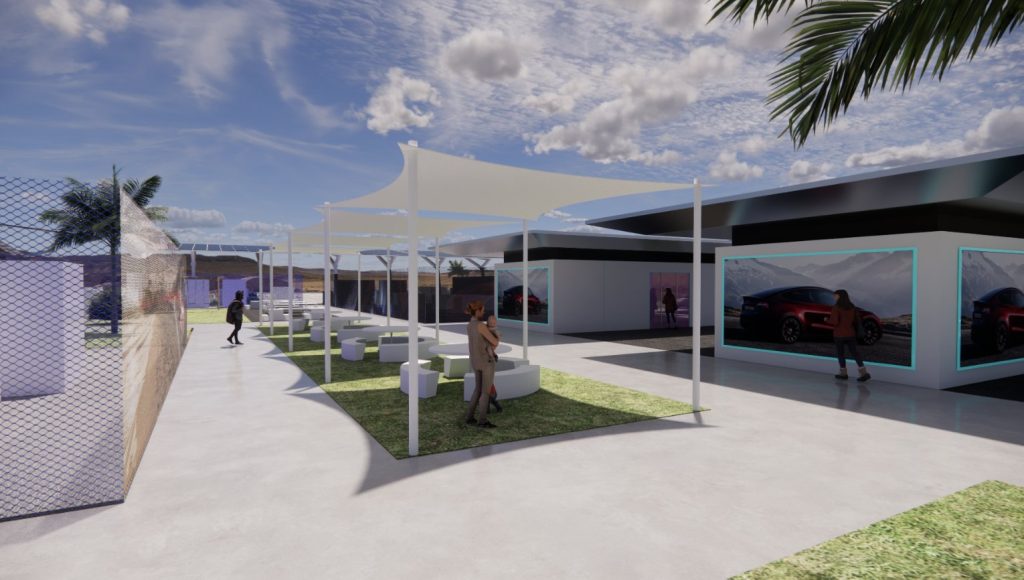
Credit: Tesla Charging | X
Tesla Supercharger Maps for North America, Europe, and Asia pic.twitter.com/0U5r0XRPyo
— TESLARATI (@Teslarati) July 2, 2025
READ MORE ON TESLA SUPERCHARGERS: Tesla launches ultra-fast V4 Superchargers in China for the first time
Testing at the LA Diner, plus Musk update on potential Tesla solar Gigafactory
The huge Tesla Supercharger station completed phase one of construction fairly quickly, especially given how long Tesla has been working on its unique Los Angeles diner, drive-in, and Supercharger location. Still, the company was seen performing some testing at the nearly-completed charging station earlier this month, and will reportedly be holding a job fair.
Elon Musk also responded on Monday morning to a post on X, suggesting that Tesla is “thinking about” building a U.S.-based solar Gigafactory in order to help support increased power needs with AI growth, and to bolster domestic solar production.
Tesla is building a new UFO-inspired Supercharger in the heart of Alien country
News
Tesla driver walks away from major accident with minor injuries
The driver sustained only minor injuries, and the exact cause of the crash remains under investigation.
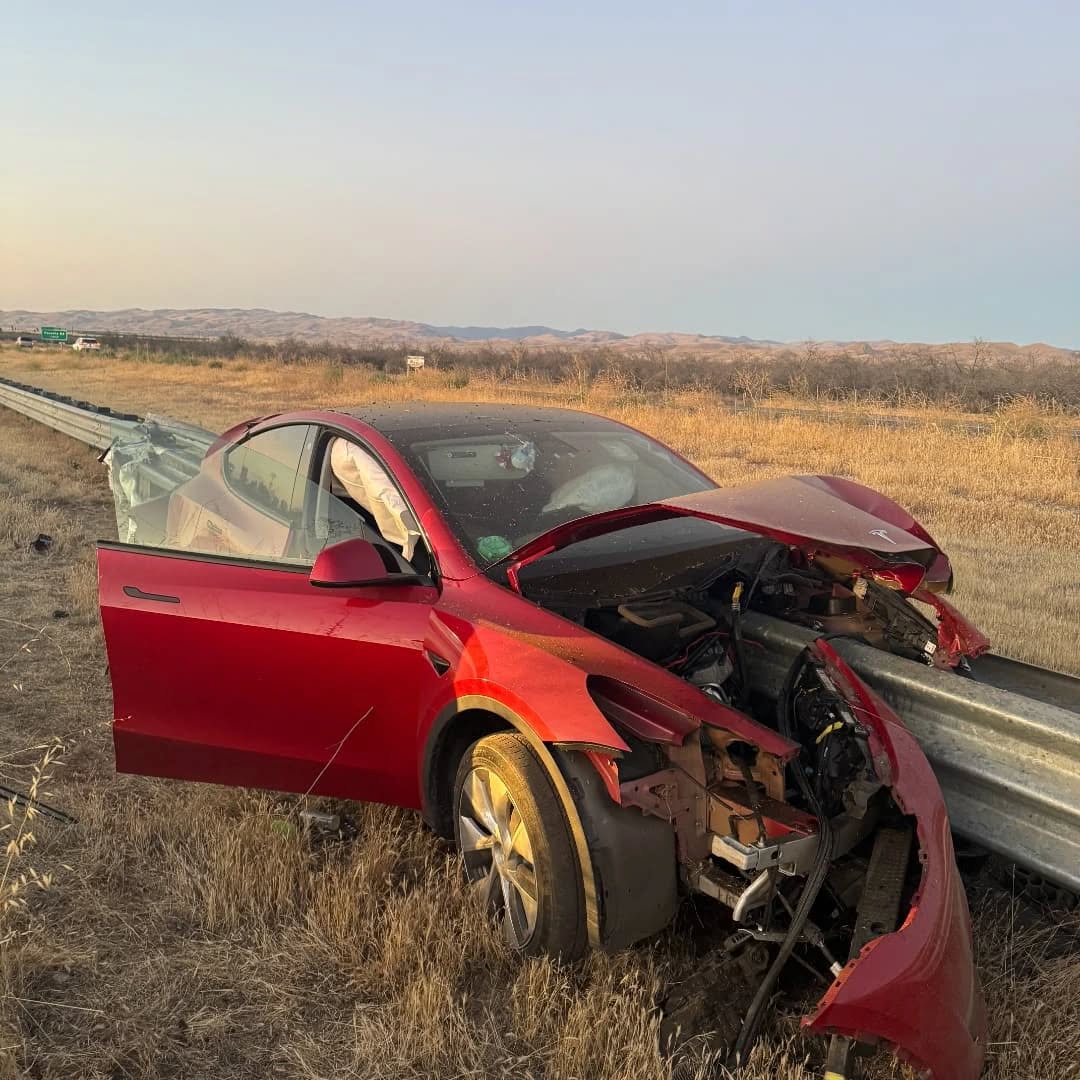
The driver of a Tesla Model Y survived and walked away from a harrowing accident on Monday in California, only sustaining minor injuries despite the vehicle being impaled by a guardrail.
On Monday morning around 4:34 a.m., the Los Banos division of the California Highway Patrol (CHP) responded to the accident on I-5 near Panoche Road, involving a 23-year-old in a Tesla Model Y. According to a post on social media, the driver veered off the road for unknown reasons in the northbound lane, before crashing directly into the guardrail and impaling the vehicle.
You can read the full message and photos from Los Banos CHP below, as were shared in a Facebook post on Monday afternoon.
This morning a Tesla model y was traveling in the #1 northbound lane of I-5 north of Panoche Rd. For unknown reasons driver allowed V-1 to veer off the roadway, travel through a dirt center divide, and crashed into the fixed metal guardrail. Lucky for the driver he only sustained minor injuries and was able to walk away. Driving a vehicle requires 100% attention to the road. Avoid distractions and focus on driving.
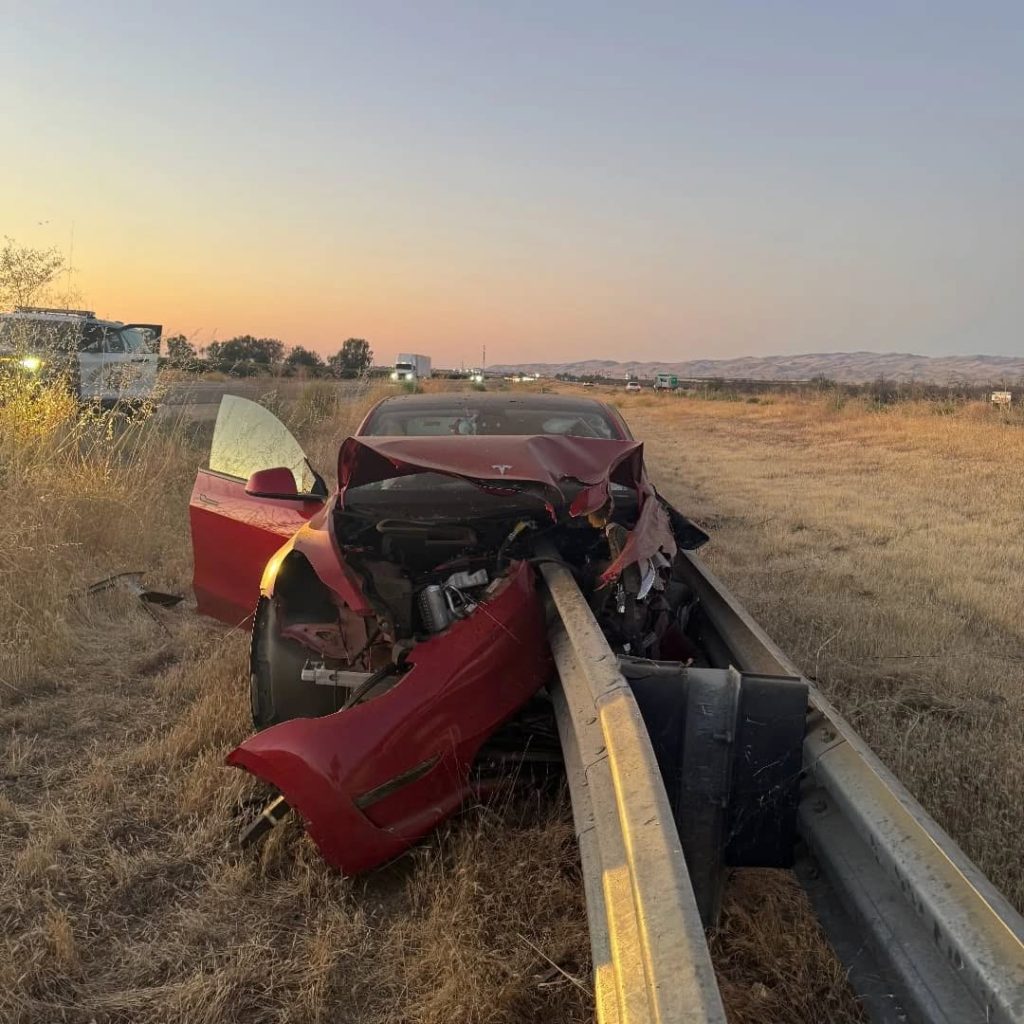
Credit: CHP Los Banos (via Facebook)
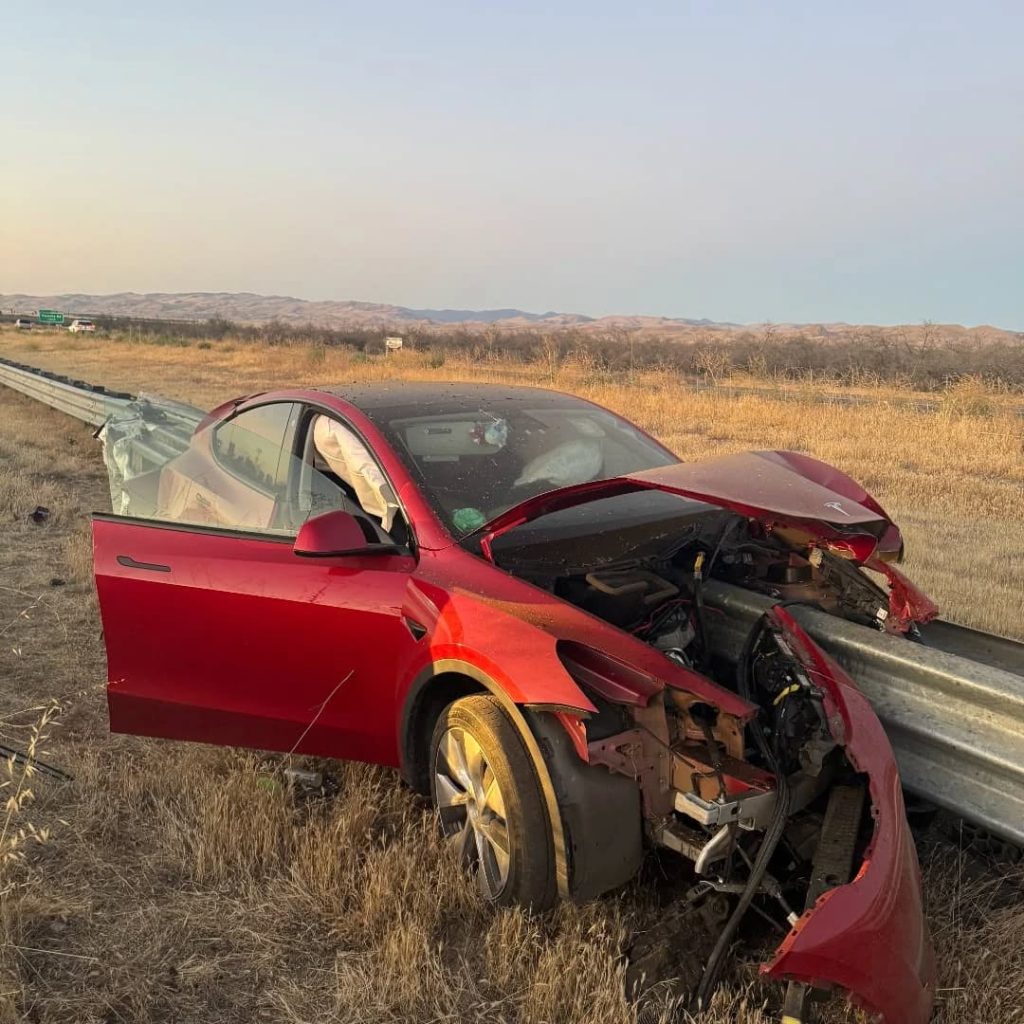
Credit: CHP Los Banos (via Facebook)
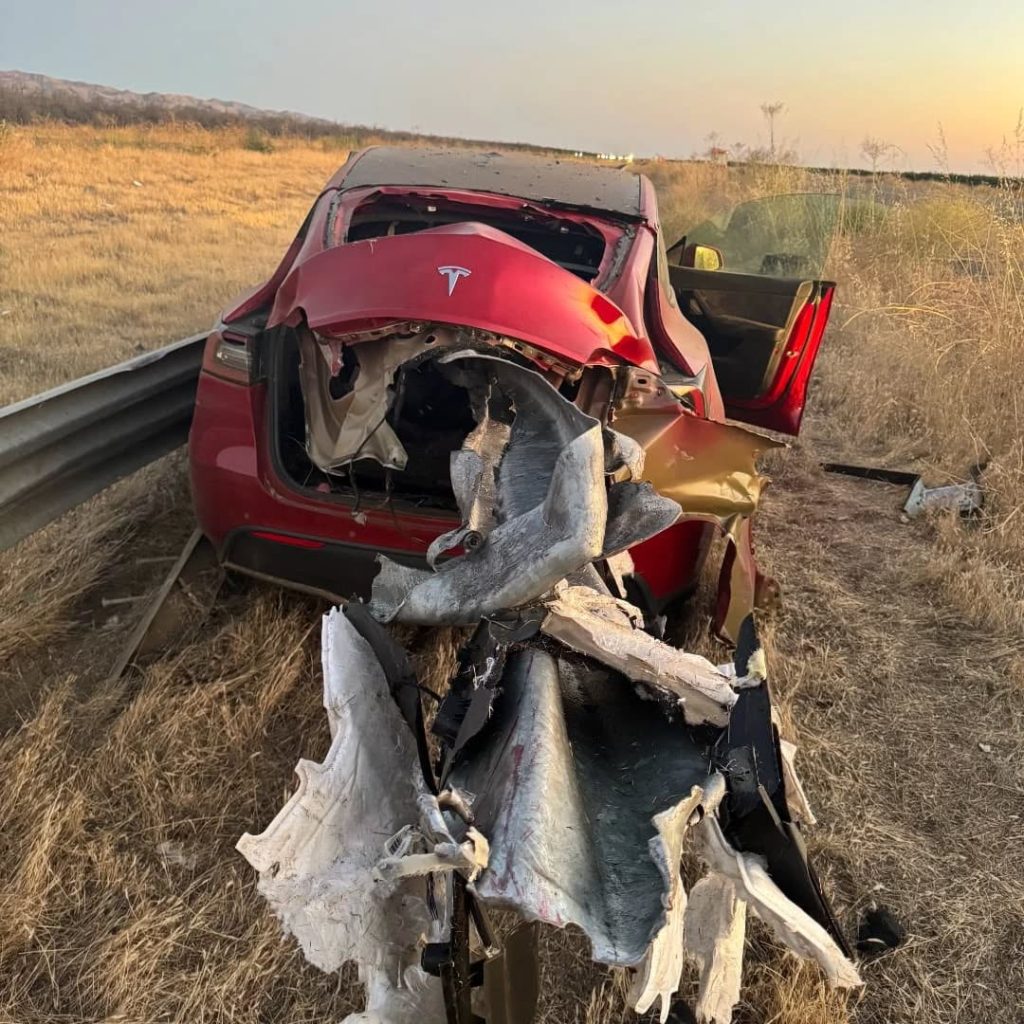
Credit: CHP Los Banos (via Facebook)
In a statement to SFGate, CHP officer Myles Anderson said that the driver only sustained minor injuries, while no arrests are made and drugs and alcohol are not suspected to have been involved. The report also notes that Tesla’s “cruise control and lane assistance features” were activated, according to Anderson. However, it’s not entirely clear if this is referring to Supervised Full Self-Driving (FSD), or to the cruise control and lane assist features baked into Autopilot.
At the time of writing, CHP has not yet responded to Teslarati’s request for clarification and additional details on the matter.
Tesla Crash Safety Ratings across its lineup: pic.twitter.com/ny30R7ceji
— TESLARATI (@Teslarati) July 1, 2025
READ MORE ON TESLA SAFETY: Tesla rolls out crucial new safety feature aimed at saving children
The news comes after Tesla has touted its vehicles as incredibly safe for many years. In December, for example, the company highlighted receiving top safety scores from regulators on four different continents throughout the world, including from the National Highway Traffic Safety Administration (NHTSA) and the Insurance Institute of Highway Safety (IIHS) in the U.S.
Tesla has also listed the goal of making its vehicles the safest on the road throughout the years, both in the overall design of its vehicles and in its Autopilot and Full Self-Driving (FSD) programs.
Tesla Model 3 ranks as the safest new car in Europe for 2025, per Euro NCAP tests
-

 Elon Musk1 week ago
Elon Musk1 week agoTesla investors will be shocked by Jim Cramer’s latest assessment
-

 News2 weeks ago
News2 weeks agoTesla Robotaxi’s biggest challenge seems to be this one thing
-

 News2 weeks ago
News2 weeks agoWatch the first true Tesla Robotaxi intervention by safety monitor
-

 Elon Musk1 week ago
Elon Musk1 week agoA Tesla just delivered itself to a customer autonomously, Elon Musk confirms
-

 News2 weeks ago
News2 weeks agoTesla Robotaxi rollout proves that Elon Musk still delivers, even if it’s late
-

 Elon Musk2 weeks ago
Elon Musk2 weeks agoxAI welcomes Memphis pollution results, environmental groups push back
-
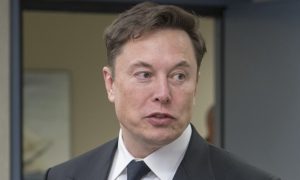
 Elon Musk2 weeks ago
Elon Musk2 weeks agoElon Musk commends Tesla team on successful Robotaxi launch
-

 Elon Musk2 weeks ago
Elon Musk2 weeks agoElon Musk confirms Tesla Optimus V3 already uses Grok voice AI

